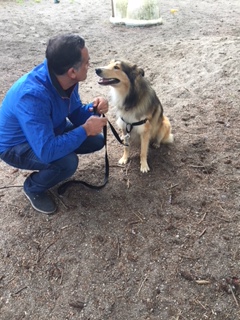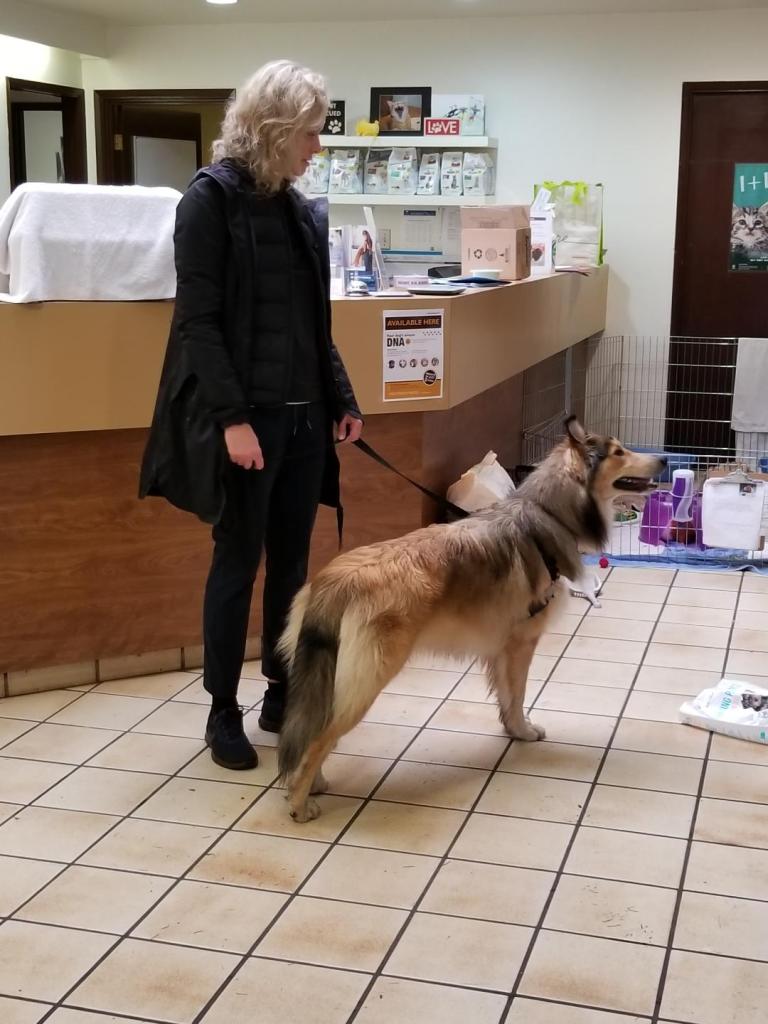Jennifer Azizi hasn’t been able to get Echo off her mind.

She and her husband Frank had an instant connection with the rough-coated Collie/Australian Shepherd mix when they met him at the SPCA shelter in West Vancouver last September.
The couple adopted Echo but he never made it to the Azizi family home.
Moments after signing the adoption papers, Echo nipped Frank twice in front of staff at the shelter.
The 10-month-old pup was put down against the wishes of the Azizis, who insisted they were committed to training him.
“I don’t see where a 10-month-old puppy who was adoptable at 2 p.m. is suddenly on death row at 11 a.m. the next morning,” Jennifer said.

The SPCA said Echo demonstrated dangerous and aggressive tendencies, biting several staff members and volunteers. The Azizis, however, said Echo’s behaviour was not extreme for a young herding dog.
The Azizis are now calling for changes to the SPCA’s euthanasia policies when dealing with animals at risk of being put down due to behavioural issues.
The couple has retained an animal welfare lawyer, not to sue the BC SPCA, but to collaborate with them and bring about changes to the organization’s euthanasia policies.
- ‘They’re overseeing themselves’: B.C. budget eliminates merit commissioner position
- Snowmobiler dies after being caught in avalanche near Fernie, B.C.
- Calls for more information on mental health, gun history of Tumbler Ridge shooter
- Surrey police chief warns force needs more officers to take over Cloverdale
“This dog was just 10 months old, I just find that unacceptable that a puppy would be put down,” Jennifer said.
The Azizis are hoping to work towards a ban on putting down puppies for bad behaviour. A puppy by its nature, Jennifer said, needs training.
She is also rallying to have the SPCA collaborate with other animal welfare organizations. In Echo’s case, the Azizis contacted a collie rescue centre that wanted to assist and said staff at the centre had also pleaded with the SPCA to spare the dog.

Get breaking National news
“I am doing it for the future, and of course for Echo not to have died in vain,” Jennifer said.
Her lawyer, Victoria Shroff, believes her client’s approach is not an attack on the SPCA.
“We are not trying to put down the SPCA. We are trying to say let’s go forward together and work with Jennifer’s policies suggestions and any other suggestions that come their way to help enhance the lives of animals,” Shroff said.
Jennifer has spoken with the SPCA’s board president and met with its CEO. Shroff described the Azizis interactions with them as a work in progress.
Dr. Karen van Haaften, senior manager of behaviour and welfare for the BC SPCA and a veterinary specialist in behaviour, said the organization is very proud of its euthanasia policies, claiming they have one of the lowest euthanasia rates of a major shelter organization in North America.
In 2018, 167 out of 6,703 dogs were put down at the SPCA in B.C. for temperament concerns. The organization said there is no need to overhaul its euthanasia policies, saying they don’t take those decisions lightly or without expertise.
When euthanasia is considered for a behaviour case, van Haaften said they start by reviewing the animal’s full history including veterinary records, and records of interactions with staff and other animals. If they can’t physically visit the animal, they review video. All of those factors are then considered by experts, including van Haaften.
Since the BC SPCA is a province-wide organization, van Haaften said it’s not possible for her to always visit every location. In some cases, branch managers are allowed to make the final call on euthanasia if the animal exhibits behaviour that falls under an “unadoptable” category, according to the SPCA’s adoptability guidelines. Van Haaften said, based on her own experiences with the BC SPCA, those scenarios are rare.
Another key policy suggestion that Jennifer has put forward is to ensure that a central team — including a behaviourist, veterinarian, trainers and possibly independent consultants — assess the animal in person over a period of several days before a final decision is made. She would also like to see authority on the fate of a dog go beyond the branch staff level.
“I think that ultimately that is the best thing for branch staff because right now they are burdened with dealing with a very traumatic situation,” Jennifer said .
“Nobody is more upset than when we have to make these decisions than the staff who care for these animals every day. The vast majority of our supporters do understand that these are the difficult decisions that animal welfare organization and vets have to make sometimes in rare cases, however it is not without cost to the people who care for these animals,” said van Haaften.
That pain was too much for Ali Ghazimirsaeed, who quit as a West Vancouver SPCA volunteer this month after two dogs he cared for — Hunter and Chuck — were put down.
“I was really shocked, especially because they were young dogs,” Ghazimirsaeed said. “I was emotionally attached to them so I felt like I lost two good friends.”
According to van Haaften, Hunter mauled a cat. The cat, she said, is alive after receiving medical treatments.
Chuck, she said, showed aggression towards other dogs but never hurt another animal. She said he was beginning to misbehave with his handlers.
Ghazimirsaeed, who wants to become a veterinarian, said the two dogs deserved special attention and not a death sentence.
“I even put my hand inside his mouth and he never bit me,” Ghazimirsaeed said about Chuck.
The Azizis are hoping their heartbreak and efforts will effect change on a policy level.










Comments
Want to discuss? Please read our Commenting Policy first.